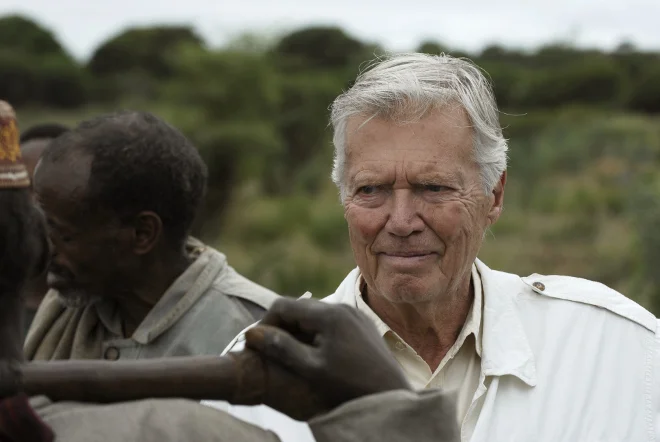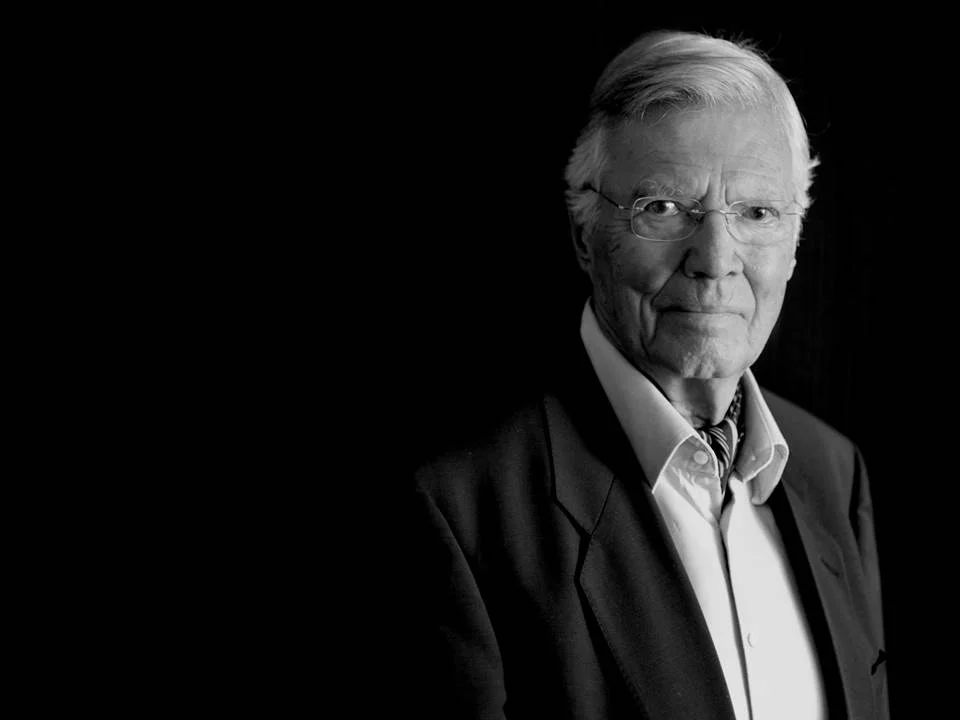More than ten years ago, on May 29, 2014, Karlheinz Böhm, the founder of Menschen für Menschen, died. His work lives on. Every year, thousands of families leave extreme poverty behind them thanks to Böhm's concept of "help for self-development" - and our generous supporters in Switzerland. Who was this man and how did he come to his radical decision to found the aid organization?
"One thousand five hundred people had gathered in miserable, tiny huts, large families crammed together in six to seven square meters. They wore only dirty rags on their bodies, and many, even the younger men, leaned on sticks because they did not have the strength to stand on their feet." This is how Karlheinz Böhm (1928 - 2014) described his first impressions of Ethiopia in his autobiography "My Way", in a refugee camp in the dusty rural town of Babile in the east of the country. The refugees were semi-nomads who had been robbed of their pastures and herds by drought and the war with Somalia. Böhm wanted to help. But how?
Just a few months earlier, the 53-year-old had no idea about Ethiopia, the huge country on the Horn of Africa. The actor had appeared in almost four dozen cinema and television films and in countless theater performances. With his first earnings, he bought a farmhouse in Cureggia above Lake Lugano, his "little paradise," as he called it, where he lived for seven years.
The radical change he decided to make in his sixth decade of life is something that no scriptwriter would have thought up. The story would have seemed too improbable: a star gives up acting to found Menschen für Menschen and from then on works voluntarily and free of charge for the poorest families in the world.
Born as the son of the famous conductor Karl Böhm, and raised partly in a boarding school in Zuoz in the Engadine, Karlheinz Böhm rose to fame early on. Alongside Romy Schneider, he became an idol in the role of Austrian Emperor Franz Joseph. These Sissi films still have an impact today: for many people, watching the repeats on television is an integral part of Christmas year after year.
Böhm has a part to play in this: "Anyone who takes a closer look at Sissi will not discover a sweet Kaiserschmarrn, but a highly professional entertainment film that also understands shadows," judges "Der Spiegel". "In many scenes, Böhm in particular conveys a hint of resignation, a feeling of unredeemed from the pressure of social and family authorities. He plays a monarch who is basically not allowed to be what he would like to be in his lonely, romantic heart." Böhm himself said that he had been a seeker for many decades – until he finally found his true calling with Menschen für Menschen.
But first he sought recognition as a character actor. He wanted to be more than just an emperor in an operetta costume. "The star destroyed his image and offended his fans," continued "Der Spiegel": In the English thriller "Eyes of Fear" (1960), Böhm played a serial killer. But the film was ahead of its time and was initially a flop with critics and audiences. It was only decades later that the film was rediscovered as a masterpiece. The New York Times included it in a list of the best films of all time. In the 1970s, director Rainer Werner Fassbinder used "Böhm's charisma" for his socially critical films. The turning point in his career, the founding of the Ethiopia Aid Organization, according to "Der Spiegel", was "a blessing for the people of the country and a bitter loss for the cinema."
Karlheinz Böhms aid to Ethiopia was not planned for a long time; on the contrary, it was more due to chance – and to the viewers of "Wetten, dass ..?", the television show hosted by Frank Elstner. "Perhaps I have never been as excited in my life as I was on that evening of May 16, 1981," wrote Böhm in his autobiography. A few months earlier, he had seen a documentary on television about the drought in the Sahel region: "It was the first time that I learned about the unimaginable poverty and the people dying there." Now he saw an opportunity to do something about it, as a guest on the show. Böhm bet that not even one in three viewers would donate a franc to the starving. Böhm won the bet, but the willingness to help was still enormous. Karlheinz Böhm flew to Ethiopia with 1.2 million francs to help – that was the start of Menschen für Menschen .
With the chutzpah of a newcomer, Böhm asked those in power whether they would provide land so that he could resettle the weakened semi-nomads from the starvation camp in Babile to the nearby Erer Valley. The astonishing thing happened: his protégés were allowed to live in the valley. The soil there is fertile. 2,100 people were able to start anew as independent farmers under the guidance of the Ethiopian employees recruited by Böhm.
The first settlers called their new village "Nagaya" ("peace"). Karlheinz Böhm regularly wrote down his experiences on his portable typewriter to inform his donors about the unbelievable poverty. His reports gave rise to the NAGAYA MAGAZINE, which continues to document the progress of the project work of Menschen für Menschen.
At first, experts laughed at the project in the Erer Valley. Here came someone who had not studied development work and wanted to do it better! But the project showed its first successes as early as 1983, when the families achieved good harvests. When asked how he achieved this first and many more successes, despite all the cultural barriers, Böhm said: "It's about speaking the language that is spoken and understood all over the world: the language of the heart."
What do you need? What are you prepared to do for it? These were his central questions. Then Menschen für Menschen helped with materials and training. So that people could work their way out of poverty. This "help for self-development" was and remains the basis of all projects.
Böhm received many honours for his life's work, but the most important award was probably the Balzan Prize, which he received in Bern in 2007, "for his life's work in the service of humanity and peace, for his unusual personal commitment, for his extraordinarily successful network of concrete support measures in Ethiopia, one of the oldest and poorest cultural countries in the world," as the justification stated: "In the middle of a highly successful acting career, Karlheinz Böhm decided to radically break with his usual life and to get involved in a major humanitarian project in Ethiopia, which he himself built up from the humblest of beginnings."
He succeeded in motivating a large group of people and thereby creating the basis for a humanitarian support program that to date "includes the construction of 173 schools, school dormitories, vocational training centers, health centers and 3 hospitals as well as agricultural and agroecological projects, the construction of water points, roads and bridges, educational programs against early marriage and female genital mutilation, as well as training and micro-credit programs to improve the situation of women in Ethiopian society." And finally: "Karlheinz Böhm is a great example of what the commitment of one individual can achieve in our world."
The question remains why a 53-year-old man would change his life in such a way. In an interview with the Neue Zürcher Zeitung, he cites the drive and motivation for his ongoing commitment as "the word with five letters - anger. His anger about the discrepancy between rich and poor in this world." It is about creatively turning his anger into action: "Talking alone doesn't help anyone."
In his active existence for others, he experienced what he apparently did not find in such depth as an actor: "I found my purpose in life in Ethiopia. It gives my life meaning because I know that what I do benefits other people." Or in three words: Helping makes you happy.
But Karlheinz Böhm also provided those who needed economic arguments - with a clarity that has lost none of its relevance even fifteen years later. In one of his last interviews, the founder of Menschen für Menschen said: "For almost half a millennium, people and every kind of development was suppressed by colonialism. We must also support Africa so that the continent can develop as an economic partner. If we forget that, we will pay a bitter price. Apart from the Chinese, no one seems to have understood that Africa could also be a sales market."
What remains of Karlheinz Böhm's example: It depends on each individual. We can all contribute something to a fairer world. "What you have done in your life lives on!" Karlheinz Böhm once said: He firmly believed that good things remain.







